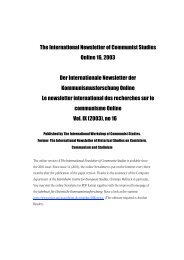VOL. XVI (2010), NO 23 - The International Newsletter of Communist ...
VOL. XVI (2010), NO 23 - The International Newsletter of Communist ...
VOL. XVI (2010), NO 23 - The International Newsletter of Communist ...
Sie wollen auch ein ePaper? Erhöhen Sie die Reichweite Ihrer Titel.
YUMPU macht aus Druck-PDFs automatisch weboptimierte ePaper, die Google liebt.
<strong>The</strong> <strong>International</strong> <strong>Newsletter</strong> <strong>of</strong> <strong>Communist</strong> Studies Online <strong>XVI</strong> (<strong>2010</strong>), no. <strong>23</strong> 31<br />
photographs as illustration material, historians usually bypass the polemics, where taking<br />
theoretical position would be unavoidable. In other words: Kardelj is put in a position where<br />
he can be easily controlled by authors, through their technique <strong>of</strong> mastering historical<br />
sources. By doing so, authors produce ideological distance and face a minimum risk to be<br />
labeled as partial or unbalanced in the debates on the troubled past.<br />
<strong>The</strong> criticism in question raises several problems. It is necessary from a methodological point<br />
<strong>of</strong> view – avoiding it would mean uncritical use <strong>of</strong> secondary historical sources; from an<br />
epistemological point <strong>of</strong> view it is rather unproductive, since the practice <strong>of</strong> historiography, if<br />
taken under critical examination, most <strong>of</strong>ten completely lacks any theory or notes on the<br />
concepts it employs, such as “nation”, “ideology”, “concept” or “totalitarianism”. In order to<br />
overcome this difficulty, additional elaboration <strong>of</strong> other schools <strong>of</strong> historiography dealing with<br />
the international communist and workers’ movement had to be taken into account, for<br />
example the works by Sheila Fitzpatrick, Eric Hobsbawm, Immanuel Wallerstein, Marcel van<br />
der Linden and the researchers <strong>of</strong> the Annals <strong>of</strong> Communism project conducted by Yale<br />
University. In realm <strong>of</strong> philosophy, works by Alain Badiou, especially his critique <strong>of</strong> the<br />
systems <strong>of</strong> real socialism and his development <strong>of</strong> the communist hypothesis, will be also<br />
critically evaluated.<br />
Additional analyses will expand the framework <strong>of</strong> research; yet not so much in realm <strong>of</strong><br />
additional historical data but mere in ambition to develop an alternative point <strong>of</strong> view in order<br />
to grasp historical phenomena in Slovenia (Yugoslavia) in light <strong>of</strong> transformations in the<br />
global capitalist world-system. I argue that the kingdom <strong>of</strong> Yugoslavia was not a mere<br />
periphery <strong>of</strong> the capitalist world-system but a periphery <strong>of</strong> the European semi-periphery<br />
comprising fascist states; that is the context in which a distinguished knowledge production<br />
took place. It took shape in social struggles referring to development <strong>of</strong> the alternative<br />
modernization models <strong>of</strong> economy, politics, education, art and culture. It is self evident<br />
therefore that the analysis had to deal not only with the central state institutions dedicated to<br />
science and primary education, but also with daily press, esoteric journals, manuscripts<br />
written by the convicts in penal colonies, illegal brochures, textbooks used in Party schools<br />
which were organized on liberated territories during the war, propaganda materials printed by<br />
the liberation movement and their opponents etc.<br />
In the late kingdom <strong>of</strong> Yugoslavia the main conflict inside elites happened between two<br />
different models <strong>of</strong> corporativism, the fascist (centralist) and the catholic (autonomist)<br />
concepts. This conflict eventually destabilized the country, but in public debates it also<br />
mobilized several distinguished social doctrines, scientific theories and philosophies ranging<br />
from neo-Thomism to dialectical materialism. My project is examining their capabilities for<br />
social mobilization as well as the immediate effects on them, caused by the occupation in<br />
1941. <strong>The</strong> latter forced the leftist anti-systemic movement to establish illegal political,<br />
educational, scientific, art and cultural institutions while right wing conservatives accepted the<br />
cultural autonomy granted to them by fascism and after 1943 even by Nazi invaders. <strong>The</strong><br />
mobilizing potential <strong>of</strong> the pre-war catholic anti-capitalist-corporatist thought and its antistatist<br />
political strategy was essentially lost; accepting the cultural autonomy imposed by the<br />
Italian military and police force, their social concepts in political practice lost the pre-war<br />
minimal distance toward fascism. Ideologists <strong>of</strong> political Catholicism, like philosopher Aleš<br />
Ušeničnik, became consequently marginalized and pro-fascist fractions in the Catholic<br />
political camp won complete hegemony.<br />
On the other hand, the leftist revolutionary national liberation movement, led by the<br />
<strong>Communist</strong> Party <strong>of</strong> Yugoslavia (Slovenia), managed to overcome in their immediate political














